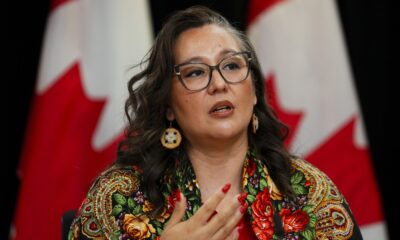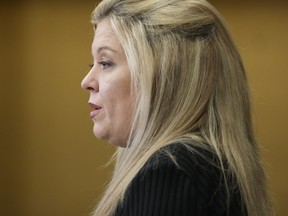Politics
Marchers Honor Missing Indigenous Women in Montreal Rally

MONTREAL – A rally took place in Montreal on October 4, 2025, drawing attention to the ongoing crisis of missing and murdered Indigenous women and girls across Canada. The event coincided with the national day of action held annually on this date. Participants, including health navigator Shirley Pien, gathered to honor the lives of those lost and to demand immediate action from government officials.
Shirley Pien, who works at an Indigenous-led health clinic, regularly visits Cabot Square, a gathering place for the city’s homeless population. She expressed her concern about women she once saw frequently who have since vanished. “In the last few months, there are women we used to see regularly that we don’t see anymore. Nobody knows where they are,” Pien remarked, reflecting the growing anxiety about the safety of Indigenous women in urban areas.
The march highlighted the findings of a 2019 national inquiry that classified the issue as a crisis. The inquiry identified “persistent and deliberate” human rights violations as contributing factors to the disproportionate violence faced by Indigenous women, girls, and two-spirit individuals. It issued a total of 231 calls to justice, primarily directed at government bodies and social service providers. The organizers of the Montreal protest criticized the government for insufficiently addressing these recommendations.
Simone Page, a shelter leader advocating for families searching for missing loved ones, emphasized the alarming issue of sex trafficking among unhoused Indigenous women. She noted that traffickers often exploit vulnerable individuals by masquerading as friends or romantic interests. Areas like hotels for medical patients and transportation hubs also serve as hotspots for these predatory activities. Page pointed out that police responses to missing persons reports are often delayed, with searches typically commencing only 24 to 48 hours after a report is filed. “Those first 24 to 48 hours are essential, especially when it comes to trafficking,” she stated.
The collective sentiment at the rally called for a more proactive approach to combat these issues. Native Nam, an artist and author from Kitigan Zibi, challenged the official statistics on missing Indigenous women, suggesting that they do not accurately reflect the reality. “Activist groups suggest the true numbers could be much more,” she told the assembled crowd. “These are not just numbers. These are our daughters, mothers, aunties, and cousins; they are us.”
In response to the ongoing crisis, the federal ministry for Crown-Indigenous Relations and Northern Affairs reaffirmed its commitment to addressing the issue. In a statement released on the same day, ministers Rebecca Alty, Mandy Gull-Masty, Rebecca Chartrand, and Rechie Valdez acknowledged the importance of community-led initiatives and highlighted funding aimed at enhancing safety for Indigenous peoples. They noted an investment of $8.5 million in August to establish transitional housing units for Métis women and children in St. Andrews, Manitoba.
The ministers also pointed to efforts made to engage Indigenous communities and create a national action plan to combat gender-based violence. This includes the appointment of a chief adviser focused on human trafficking, aimed at improving the safety and well-being of Indigenous women across the country.
As the rally concluded, participants expressed a determination to continue advocating for justice and accountability. The powerful gathering served as a reminder of the urgent need for collective action to protect Indigenous women and rectify the systemic issues that contribute to their vulnerability.
-

 Politics4 weeks ago
Politics4 weeks agoSecwepemc First Nation Seeks Aboriginal Title Over Kamloops Area
-

 World5 months ago
World5 months agoScientists Unearth Ancient Antarctic Ice to Unlock Climate Secrets
-

 Entertainment5 months ago
Entertainment5 months agoTrump and McCormick to Announce $70 Billion Energy Investments
-

 Science5 months ago
Science5 months agoFour Astronauts Return to Earth After International Space Station Mission
-

 Lifestyle5 months ago
Lifestyle5 months agoTransLink Launches Food Truck Program to Boost Revenue in Vancouver
-

 Technology3 months ago
Technology3 months agoApple Notes Enhances Functionality with Markdown Support in macOS 26
-

 Lifestyle3 months ago
Lifestyle3 months agoManitoba’s Burger Champion Shines Again Amid Dining Innovations
-

 Top Stories2 months ago
Top Stories2 months agoUrgent Update: Fatal Crash on Highway 99 Claims Life of Pitt Meadows Man
-

 Politics4 months ago
Politics4 months agoUkrainian Tennis Star Elina Svitolina Faces Death Threats Online
-

 Sports5 months ago
Sports5 months agoSearch Underway for Missing Hunter Amid Hokkaido Bear Emergency
-

 Politics5 months ago
Politics5 months agoCarney Engages First Nations Leaders at Development Law Summit
-

 Technology5 months ago
Technology5 months agoFrosthaven Launches Early Access on July 31, 2025



















